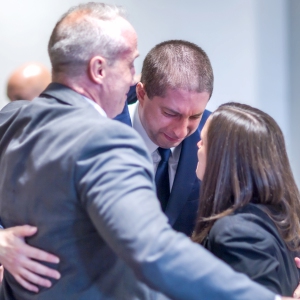His parents brought him for urgent psychiatric help. Then, he waited in the emergency room for nearly a month.
| Published: 11-07-2021 6:17 PM |
Jeremy Sheppard returned from visiting his son at the emergency room last week to his quaint brick house in Derry.
“He’s really depressed, and it’s going not well for him right now,” he told his wife. “Twelve days in isolation will do that.”
Sheppard and his wife, Kristen, brought their 17-year-old son to the emergency room in late September to get him mental health treatment at an inpatient psychiatric facility.
After two weeks at Parkland Medical Center and twelve days at Portsmouth Regional Hospital, their son Christopher was still waiting in a windowless room outfitted with a hospital bed, a television and a two-way mirror for nurse supervision.
Christopher, who had intellectual disabilities, cognitive delays and PTSD, struggled in the emergency room, where he spent most of the day alone. Screaming coming from down the hall kept him up at night. The constant door-slamming from the nurse’s triage station across the hall made him agitated and aggressive.
“This is what solitary confinement is, minus the TV,” Kristen Sheppard said.
New Hampshire has seen a record number of children in need of urgent mental health care over the last year— the number of children calling a state-wide crisis hotline increased by nearly 20% in 2020. The demand for youth mental health beds has dramatically outpaced the state’s resources, creating a backlog of children in hospital emergency rooms, which often do not have the resources to care for children in psychological distress. Last week, 18 children were on the waiting list for an inpatient psychiatric bed, according to NAMI New Hampshire.
Article continues after...
Yesterday's Most Read Articles
 Bill to allow ‘no fault’ evictions makes it to governor’s desk
Bill to allow ‘no fault’ evictions makes it to governor’s desk
 ‘He’s coming home’: Jury acquits former prison guard Matthew Millar in murder trial
‘He’s coming home’: Jury acquits former prison guard Matthew Millar in murder trial
 Look, up in the sky! It’s… an Airstream trailer?
Look, up in the sky! It’s… an Airstream trailer?
 Around Concord: Living in an 1856 schoolhouse is (mostly) delightful
Around Concord: Living in an 1856 schoolhouse is (mostly) delightful
 Slots and no bet limits: State budget shakes up New Hampshire’s casino landscape
Slots and no bet limits: State budget shakes up New Hampshire’s casino landscape
 ‘Deep flavor’ – New restaurant in downtown Concord offers creative spin on comfort food and cocktails
‘Deep flavor’ – New restaurant in downtown Concord offers creative spin on comfort food and cocktails
When Christopher was younger, Kristen could calm his meltdowns by wrapping her arms around him, barrel rolling him onto the carpet and holding him until he settled. As he grew into a 230-pound young man, his mother’s strategies no longer worked.
Unintentionally, he became dangerous to his family while struggling with frustration and anger he couldn’t understand or control. After he pulled an airsoft gun on his brother, which looked almost identical to a real 9mm pistol, the Sheppards decided it was no longer safe for him to live at home.
Kristen said she worries that in the pursuit of help for her son, they have done irreparable damage to his mental health.
Thirteen days into his stay at Parkland Medical Center emergency room, Christopher began hallucinating, something he never experienced before arriving at the hospital.
“When I saw him, he was very scared,” Kristen said. “He kept saying, ‘The demons keep moving around, and they keep telling me to kill myself and if I don’t kill myself, they’re gonna kill me.’ ”
She said during his two-week stay at the Parkland emergency room, he tried to escape the facility several times, once successfully breaking past security guards and running into downtown Derry. A spokesperson for Parkland Medical Center said they could not comment on Christopher’s specific case but noted that staff “constantly assesses patients for their safety and flight risk.”
Jeremy and Kristen said they feel that many of Christopher’s basic needs have not been met during his hospital stays. They said he was taken to shower three times over the course of 14 days at Parkland. A spokesperson from the hospital did not respond to questions about the frequency of showers minors are entitled to during their stay.
At Portsmouth, Christopher’s parents said his visitations and calls were tightly regulated. He was granted two 15-minute calls a day, which they said were sometimes revoked if hospital staff deemed he had misbehaved. His two hours of visitations — rigidly set between noon and 2 p.m. every day — were sometimes canceled if the emergency room was busy.
Through a spokesperson, Dean Carucci, the CEO of Portsmouth Regional Hospital, and John Skevington, the CEO of Parkland Medical Center, said limited beds at Hampstead Hospital, a youth mental health facility, often causes children to wait in emergency rooms for “more time than is ideal.” The hospital compensates for this by providing individualized therapy on a case-by-case basis, they said.
“The only hospital appropriate for children and adolescents in the state of New Hampshire is Hampstead Hospital, which often has a long waitlist for admissions,” they said.
They said at both hospitals, the current visitation guidelines stipulate that one parent can visit between 8 a.m. and 8 p.m., though those rules may change depending on pandemic guidance and the patients’ “specific needs as well as the direction of the patient’s care team.” They did not respond to questions regarding whether visitations could be canceled for behavioral reasons.
The New Hampshire Supreme Court ruled that psychiatric patients cannot be held involuntarily in emergency rooms for longer than three days without a chance to contest their detention. The decision spurred sweeping investments in the mental health system to reduce the amount of time psychiatric patients are waiting in emergency rooms. However, the ruling rarely applies to children, who are often voluntarily admitted by their parents.
Becky Whitley, a State Senator from Hopkinton, said the best way to decongest the emergency rooms is by expanding community mental health resources that can prevent some children from going to the hospital in the first place.
Senate Bill 14, passed into law in June 2019, allocated funding for mobile crisis teams, a 24/7 hour service that dispatches a clinician and a “peer support specialist” – someone recovering from their own mental illness – to children in need. She said the Department of Health has been slow to realize the law’s goals.
“There has been movement to get the mobile crisis up and running,” she said. “But certainly right now, you cannot say that children have statewide access to mobile crisis within one hour.”
Another important piece of limiting the number of children waiting in emergency rooms is increasing the number of psychiatric beds devoted to youth mental health care. Officials at Hampstead Hospital, a private inpatient psychiatric facility for children, said the facility has served an average of 40 children at a time, though the program has the capacity for more than 100 beds. Service was limited due to staffing shortages. Gov. Chris Sununu announced earlier this month that the state was in the final stages of purchasing the facility to open up additional beds for children.
After 28 days in the emergency room, Christopher was placed at Hampstead Hospital. Though he has finally moved onto the next stage of his treatment, Kristen said the experience has inspired her to push for change in the mental health system.
“He just said, ‘I want to go home, I want to go home,’ ” Kristen said.
“He said it isn’t fair, and he’s right.”
]]>







 Celebrating independence: A list of local July 4 celebrations
Celebrating independence: A list of local July 4 celebrations Around Concord: Over The Moon Farmstead brings mead, beer, pizza and music to Pittsfield
Around Concord: Over The Moon Farmstead brings mead, beer, pizza and music to Pittsfield Around Concord: The Balshaws bring a rustic revival to the Canterbury Country Store
Around Concord: The Balshaws bring a rustic revival to the Canterbury Country Store
